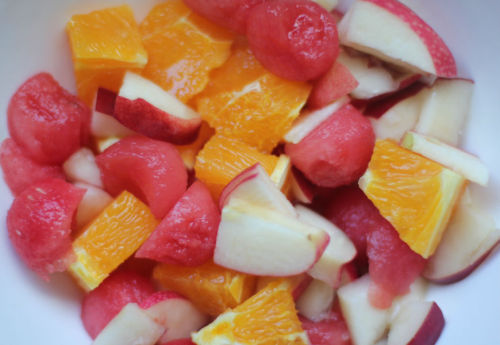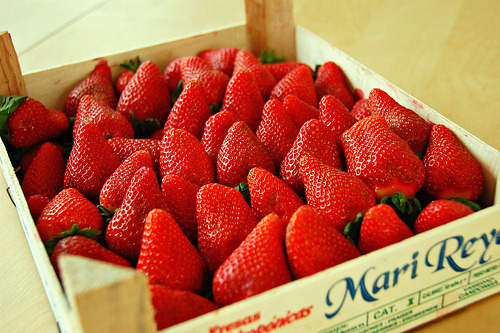Fruit and fat loss
date: 2012-11-10  time: 23:45:00
time: 23:45:00
 time: 23:45:00
time: 23:45:00 The amount of fruit sugar (fructose) varies from fruit to fruit and may have some adverse metabolic effects, such as a decrease in fat burning. However, the benefits of fruit (low in caloies, high in fiber, water and nutrient content) outweigh the adverse effects on most people. But if you are having trouble losing weight and can't figure out why, limiting your fruit intake may help.

Firstly, it's important to differentiate between naturally occuring sugar and added sugar. Most experts recommend a minimum of 130 grams of total carbs per day, including fruits and whole grains. In general, no more than 10 percent of your calories should come from added sugars found in products like sweetened beverages, sauces and dressings. While fruit does not contain added sugars, if you are trying to lose weight, limiting your sugar intake is key, and this means no more than two servings of fruit per day. That's a medium banana and a half cup (1 dl) of berries. But if you're active and do not have excess belly fat, you can go up to three or four servings a day.

Besides sugar, the total number of calories also counts. Fruit contains almost three times the calories per serving as most nonstarchy vegetables, so don't consider fruit a "free food" (where the calories don't matter), as you may unknowingly consume up to 250 extra calories per day. This may prevent you from losing one pound of fat every two weeks. Avoid dried fruit, fruit cups and fruit juice, since they're higher in calories and typically lower in fiber than fresh or frozen fruit. For effective weight loss, stick with fresh or frozen fruit only. And remember, while natural sugar is healthier than refined sugar or high-fructose corn syrup, it still contains the same number of calories per serving (four per gram).

Slim pickings
Some fruit pack hidden, weight-loss and fat-burning potential. Add these to salads, stir into yogurt, whirl into a smoothie or eat out of hand.
1. Apples contain pectin, a great source of dietary fiber, which keeps you full longer and helps in weight loss.
- Dip a few slices in natural peanut butter for a mid-morning snack.
2. Cranberries have antimicrobial properties that render E. coli bacteria harmless, warding off kidney and urinary tract infections.
- Mix a few into your morning oatmeal with chopped walnuts. Add raw honey to tame the tartness, if desired.
3. Berries contain soluble fiber, which slows digestion and helps to reduce body fat build-up.
- Toss a handful into a protein shake or mix into a Greek yogurt parfait.
4. Grapefruit contains nootkatone, a naturally-occurring energy booster, which may help increase fat burning.
- Garnish a warm chicken breast salad with several slices.
5. Persimmons contain six grams of fiber per fruit, twice the amount as apples.
- Eat one per day, and try it with the skin intact.
The benefits of sugar in fruit
date: 2012-09-16  time: 19:34:00
time: 19:34:00
 time: 19:34:00
time: 19:34:00 This idea that fruit is somehow a bad thing to eat came into full swing with the low carb diet craze, but the myth persists. Not a week goes by that I don’t hear someone tell me that they avoid fruit because it’s “all sugar” or “loaded with carbs.” So, I want to set the record straight and come to the defense of some of the world’s healthiest foods – fresh, whole fruits.

I’ll tackle the “fruit is all sugar” statement first – because it’s just plain wrong. Fresh fruit offers so much more than the natural sugar it contains – including water, vitamins, minerals, fiber and phytonutrients (those naturally-occurring plant compounds that have wide ranging beneficial effects on the body). Where else can you get a package like that for about 75 calories per serving?

The idea that fruit is “loaded with carbs” or is “full of sugar” needs to be put into perspective, too. It’s true that when you eat fruit, the overwhelming majority of the calories you consume are supplied by carbohydrate – mostly in the form of fructose, which is the natural sugar in the fruit.

But that’s the nature not just of fruit, but of all plant foods – they’re predominantly carbohydrate (and that means not just natural sugars, but healthy starches as well as structural elements, like cellulose, that provide fiber). When you eat vegetables, the majority of the calories you’re eating come from carbohydrate, too. But you don’t hear people complaining that vegetables are “loaded with carbs.”

Before dismissing foods as being loaded with sugar, or too high in carbs, consider not only the amount of sugar or carbs you’re eating, but the form of the carbohydrate, too. There’s a big difference between the nutritional value of the natural carbohydrates found in fruits and other plant foods – the sugars, starches and fibers – and what’s found (or, more accurately, what’s not found) in all the empty calories we eat from added sugars that find their way into everything from brownies to barbecue sauce.

Faced with a serving of fruit, how much sugar are we talking about, anyway? An average orange has only about 12 grams of natural sugar (about 3 teaspoons) and a cup of strawberries has only about 7 grams – that’s less than two teaspoons. And either way, you’re also getting 3 grams of fiber, about a full day’s worth of vitamin C, healthy antioxidants and some folic acid and potassium to boot – and it’ll only cost you about 50 or 60 calories. “All sugar?” I think not.

By contrast, 5 dl (20-ounce) cola will set you back about 225 calories and, needless to say, won’t be supplying any antioxidants, vitamins, minerals or fiber. You’ll just be chugging down some carbonated water, maybe some artificial color and flavor, and somewhere in the neighborhood of 60 grams of added sugar (about 3/4 dl [1/3 of a cup]).

You won’t get fat on eating fruit. You won’t be consuming an insane, over-the-top amount of sugar. Don’t be afraid of eating fruit, because they are the best thing you can give your body.







